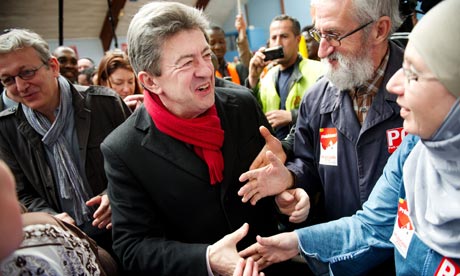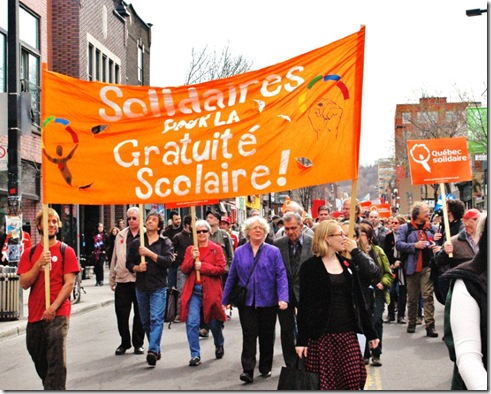France: Sarkozy facing defeat as polarised electorate leans left

Jean-Luc Mélenchon.
By Dick Nichols
April 30, 2012 -- Links International Journal of Socialist Renewal/Green Left Weekly -- The results of April 22 first round of the presidential elections in France directed a powerful spotlight on a society polarised by economic crisis and the austerity regime of President Nicolas Sarkozy and his ruling Union for a Popular Movement (UMP) government.
As in the 2002 presidential poll, candidates to the left of the Socialist Party (SP), including Europe Ecology-The Greens (EELV), won more than 15% of the vote, while the xenophobic National Front (FN) of Marine Le Pen registered its highest vote ever—17.9% (up 7.5% from the 2007 presidential poll).
However, unlike the 2002 contest, this far-left vote did not come at the expense of the SP (which in 2002 was beaten into third place by the FN). This time the SP’s François Hollande took first place, with 28.6% of the vote (up 2.8% from 2007).
Quebec students call for a social strike in solidarity with their struggle
April 28, 2012 -- The following is a statement issued recently by CLASSE. CLASSE is the largest of the student coalitions or federations leading the student strike movement that has spread across Quebec. It represents more than half of the 180,000 students now on strike. The statement was translated by Richard Fidler for the Life on the Left web site.
* * *
Toward a social strike: It’s a student strike, a people’s struggle
Hike in tuition fees is part of “the cultural revolution”
Syria: Marxist intellectual arrested -- Free Salameh Kaileh!

By Omar S. Dahi and Vijay Prashad
April 26, 2012 --Jadaliyya -- At 2 am on Tuesday, April 24, 2012, the Palestinian-Syrian intellectual and activist Salameh Kaileh was arrested from his home “without explanation”, as his lawyer Anwar Bunni of the Syrian Centre for Legal Studies and Research put it. This is not Salameh Kaileh’s first time in a Syrian prison. He was a guest of the Assad family in its several jails for eight years and 11 days in the 1990s.
How revolutionaries of Lenin’s time resisted austerity

Towards the end of 1921, an attempt was made to shift the burden of debt to the working class through higher sales taxes. The German Communist Party opposed this, demanding instead an increase in the tax on wealth and the seizure of assets.
Introduction by John Riddell
April 26, 2012 -- Links International Journal of Socialist Renewal/johnriddell.wordpress.com -- Economic collapse drives workers into hunger and destitution. Foreign powers extort huge payments, forcing the national economy toward bankruptcy. The government forces workers to pay the costs of capitalist crisis.
This description of Greece in 2012 applies equally to Germany in 1921.
How should a workers’ party respond to such a breakdown? The proposals of the German Communist Party (KPD) included a simple approach to fiscal policy: tax those who own the country’s productive wealth.
The KPD was then a member of the Communist International, whose leadership included V.I. Lenin, Leon Trotsky and Gregory Zinoviev.
Peter Camejo: Against sectarianism -- the evolution of the Socialist Workers Party, 1978-1983
AGAINST SECTARIANISM
The Evolution of the Socialist Workers Party 1978-1983
by Pedro (Peter) Camejo
USA: 'Capitalism or Common Sense?' An Occupy Wall Street Class War Camp pamphlet

At the request of the author, Links International Journal of Socialist Renewal is happy to make available a new pamphlet produced by radical Occupy activists in United States, in the interests of the advancing discussion in the movement. The pamphlet can be downloaded free HERE (in PDF) or you can read it on screen below.
* * *
For more on the #Occupy movement, click here.
By Pham Binh
April 18, 2012
Occupy!
Who would’ve imagined the word “occupy” would inspire millions to take direct action and stand up for the 99% here in America after brutal occupations in Iraq, Afghanistan, and Palestine?
Now there’s Occupy Pakistan and even Occupy Nigeria.
Occupy is more than a movement, less than a revolution, and long overdue. Occupy isn’t about ideology, it’s about the 99%, hence why pacifists and insurrectionists, anti-capitalist anarchists/socialists and pro-capitalist libertarians, liberal Democrats and Ron Paul Republicans, vegans and omnivores have come together despite our differences.
Paul Le Blanc: The birth of the Bolshevik party in 1912

Portrait of Lenin by Isaac Israelovich Brodskii, 1924.


